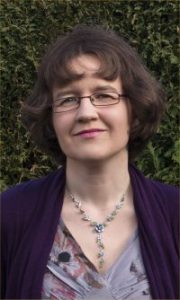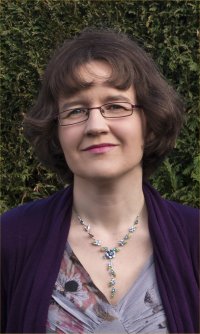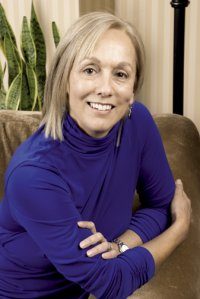Stephanie Burgis: Masks & Shadows

Stephanie Burgis was born May 28, 1977 in East Lansing MI. She attended Michigan State University, and was assistant to the director of the Clarion workshop there in 1996. She transferred colleges to the Oberlin Conservatory of music, studying French horn performance and music history. She spent a year at the University of Vienna on a Fulbright scholarship, and got her Master’s degree in historical musicology at the University of Pittsburgh. The following summer, in 2001, she attended Clarion West. In 2002 she began doing PhD work at the University of Leeds, relocating to England in part to be with her second husband Patrick Samphire, also a writer. They were married in 2004, and have two children, one born in 2008, and the other in 2013.
Debut novel A Most Improper Magick (2010; as Kat, Incorrigible in the US, 2011) launched The Unladylike Adventures of Kat Stephenson series, middle-grade fantasies set in Regency England. Other books include A Tangle of Magicks (2011; as Renegade Magic in the US, 2012), Stolen Magic (2013), and a YA novella about Kat as a teenager, Courting Magic (2014). Her first novel for adults, a historical fantasy tentatively titled Masks and Shadows, is forthcoming in May 2016. Burgis has also published extensively as a short fiction writer and book reviewer.
Burgis is now a dual American/British citizen. She lives in Wales with her family.
Excerpts from the interview:
‘‘I went to Clarion West in 2001 and I came out of the closet about wanting to be a writer more than an academic. At the workshop I met Patrick Samphire, who I later married. My life plans changed drastically that summer. I came back to Pittsburgh and immediately started applying to universities in England, where Patrick lived. In 2002 I started doing a PhD at the University of Leeds on opera and politics in 18th-century Vienna. I did a lot of research. My book Masks and Shadows, coming out next year, is my PhD research turned into a novel.
‘‘When I was a kid, my dad read to me and to my brothers every night for years and years. Obviously, it would have started out with picture books and chapter books. Then it turned into Roger Zelazny and all the others. He read to me every night until I was 12 or 13. It was great. The two books that were seriously influential when he read to me were Lord of the Rings and Pride and Prejudice. Those were my big impact books. I came out of childhood and my two obsessions were fantasy adventure and Regency England. The Kat books combine them both, so they make me happy.
‘‘I started out writing adult books. I had a really good time writing some of them. I’d gotten close to publication without quite getting there, and I thought I had to keep writing that same kind of book: for adults, fairly dark, fairly serious. Then I was diagnosed with ME (myalgic encephalomyelitis). I got sick in 2005, and got my diagnosis in 2007. When I finally got the diagnosis, that was the hardest. Until then I was waiting, thinking I’d find the right medicine and I’d get better. I got the diagnosis and they said it was incurable and I’d have it for the rest of my life, probably. I lost my job with the opera company because I couldn’t get to work. It was the wrong time for me to be writing dark, serious fiction. It was not an escape for me. I ended up giving in and writing something lighter.”
…
‘‘I was always obsessed with opera, which explains why I studied it at university for so many years. I fell in love with it as a teenager the first time I went to see an opera, Madame Butterfly. Operas didn’t come to my town that often. I went along, not sure what I would think, and I was just bowled over. It was amazing. Then I went to music school and played in the orchestra pit for some operas. I went on into music history and that was my focus, and I worked in an opera company.
‘‘One of the best things that happened in my writing career was when I came to Leeds and was introduced to another Clarion West graduate, Justina Robson. She became my landlady for most of the time we were in Leeds. We lived just down the street from one another and had coffee most days. She’s amazing in many ways. She said to me, ‘Why on Earth aren’t you writing about the stuff you’re really interested in?’ Meaning my geeky obsessions. Masks and Shadows is my way of bringing together fantasy and opera. It’s set in the 18th-century palace of Esterháza in Hungary, part of the Austro-Hungarian empire. This is the palace where Joseph Haydn worked as the court composer. It’s a historical fantasy novel with alchemists and mystery and a plot to assassinate the emperor and empress, who are visiting. It’s extremely romantic. The romantic hero is a castrato opera singer, which was a hot political issue in the time period. In the same way people are debating gay marriage nowadays, there was court case after court case about whether it was legal for castrati to get married. A whole bunch of people said it wasn’t legal because they couldn’t have children, and ‘‘obviously’’ women can only be married to ‘real’ men, etc. My agent called it a ‘wildly romantic historical fantasy in which music, magic, and blackmail meet, and one of the most famous castrato opera singers of the 18th century must come together with a very proper widow to prevent the assassination of the Hapsburg emperor and empress.’ The book is extremely operatic and over the top. It’s divided in acts like an opera, with multiple point-of-view characters. It’s like an 18th-century Downton Abbey with magic.”
…
‘‘The Kat books are adventures set in Regency England. I love, love, love Jane Austen and Georgette Heyer. One recurring thing in several of their books is the romantic heroine, who is the star, and who has a snarky little sister who pops in and is not all that relevant to the plot. I wanted to know about her – to write the book about the snarky little sister who’s rolling her eyes about her older sister’s romantic misadventures and having more exciting magical adventures of her own. Every day before writing I would read Jane Austen’s letters to get myself in the headspace of the time period, and get a sense of the style. I based a lot of the details of Kat’s family situation on Jane Austen’s family, which is an homage because I love Jane Austen. Kat lives with her genteel but impoverished vicarage family. Her father takes in students. A lot of the research came out of time that I should have spent doing my PhD work. I was supposed to be doing late 18th-century musical research, but there were a lot of days and weeks when I threw it all over for the section of the library where they had letters and diaries of 18th-century women, because they were just so interesting. By the time I started writing the Kat books I’d done a lot of research by accident.
‘‘The trilogy takes place over the course of about a year. During that year, Kat catches spouses for all three of her older siblings, much to their chagrin, sometimes, in the ways she manipulates their relationships. She’s certain that she knows better than her brothers and sisters. The trilogy finished and had some lovely reviews, which is very nice, but it was definitely done. Still, I kept getting letters from readers asking who Kat ends up with, because she made romantic matches for every one of her siblings. What about her? I kept thinking, ‘I can’t sell a book about grown-up Kat – these are children’s books.’ So last year I wrote a novella, Courting Magic, about Kat’s romance, and I put it out myself. That was a really fun experience. It was nice to do something as a ‘thank you’ to the readers who responded so generously to the Kat books. It was a huge gift to myself because it was like writing fanfic in my own world. I call it my young-adult novella. It’s supposed to stand alone. Obviously, you get more out of it if you know who these characters are and their history, though.”
…
‘‘I can’t imagine writing anything without magic because it wouldn’t be fun for me. I love the sense of wonder in fantasy. Even in dark fantasy there’s a whole opening-yourself-to-wonder when magic is a factor. It gives me a sense of wonder when I write, to have a fantasy element. In general my philosophy of writing is I want to write smart, fun books. I want them to be both. I want them to be escapes for people. I really mean that. Escapist fiction is used as such an insult by so many people. But I would say, having been through some seriously bad times, I feel such gratitude for the writers whose books let me escape and feel a sense of wonder, even if in my own life I was going through a very dark moment, like when I was diagnosed with ME, when I felt my life closing down and becoming darker. Even my lightest books have a real emotional heart in them. The emotions are always true. There’s always going to be positivity. I’m never going to write grimdark. There’s always going to be hope, and that’s because I need it in my own life. I want to provide that to other people.’’







